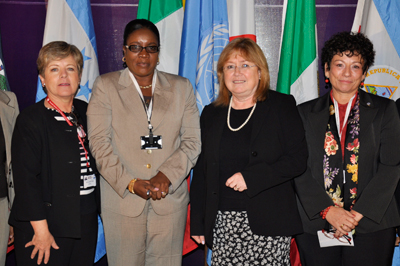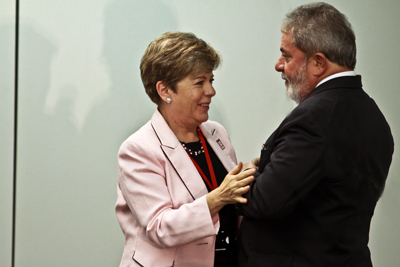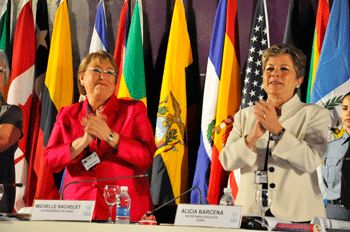Women Must Be Placed at the Centre of Development for the Rebuilding of Haiti and Chile
Topic(s)
Authorities and representatives of the United Nations discussed the challenges outstanding in this area at the Eleventh session of the Regional Conference on Women in Latin America and the Caribbean, now under way in Brasilia.

(Brasilia, 15 July 2010) Women and children have borne the brunt of the devastating natural disasters -earthquakes and tsunami- which struck in Haiti and Chile in January and February 2010. Now action must be taken to place women, in particular, at the centre of the reconstruction effort.
This was the main conclusion of a special session entitled "Haiti and Chile: (re)building equality", held today in Brasilia in the framework of the Eleventh session of the Regional Conference on Women in Latin America and the Caribbean.
The meeting, which was attended by Susana Malcorra, Under-Secretary-General for Field Support of the United Nations, was chaired by Alicia Bárcena, Executive Secretary of the Economic Commission for Latin America and the Caribbean (ECLAC), and moderated by Marjorie Michel, Minister of Women's Affairs and Women's Rights of Haiti.
Bárcena recalled that Brazil and Chile are two countries that have shown tremendous solidarity with the Haitian people, having been active participants in the United Nations Stabilization Mission in Haiti (MINUSTAH).
An earthquake assessment conducted by the Government of Haiti with technical support from ECLAC, the Inter-American Development Bank, the World Bank, the United Nations system and the European Commission, found that the total damage could exceed US$ 7.8 billion, representing over 120% of Haiti's GDP in 2009.
The disaster cost the lives of 222,000 people. 311,000 were injured and 1.5 million -almost 15% of the population- suffered material damages.
Susana Malcorra, who coordinates the United Nations peacekeeping missions across the world, said that "the earthquake in Haiti is probably the most terrible tragedy in recent history", but noted that it also opened an opportunity to place women at the centre of reconstruction and development work.
"A long and painful road lies ahead towards the rebuilding of Haiti. Only time will tell us the full impact and severity of the tragedy," she said.
Malcorra said that the United Nations had lost 101 staff members in the catastrophe and referred in particular to Luis Carlos Acosta, a distinguished Brazilian United Nations officer in Haiti. She emphasized that women formed 30% of peacekeeping forces and a strong commitment existed to increase this proportion in the future.
Marjorie Michel gave an overview of the situation of women in her country and acknowledged that, despite the progress made in recent years, inequalities persist and represent a barrier to efforts to enhance their status.
"Now that the emergency stage of earthquake assistance has ended, the country is assessing the resources it will need for reconstruction, which should lead to a more egalitarian and fairer situation for women," she emphasized.
A statement was also given by Belén Sapag, First Secretary of the Permanent Mission of Chile to the United Nations of the Ministry of Foreign Affairs of Chile, who agreed with the other speakers that it was necessary to place women at the heart of rebuilding efforts. "Women are more exposed to vulnerability, and emergencies such as these serve as opportunities to make women's situation more visible," she declared.
It was urgent, she added, to improve the quality of social indicators of the countries, in order to disaggregate official statistics by sex and age and thus obtain an accurate picture of the status of women. The earthquake and tsunami that struck Chile had killed 521 people.
The session was also attended by Sergia Galván, Executive Director of the Women and Health Collective of the Dominican Republic, and Lise Marie Dejean, National Coordinator of Solidarity with Haitian Women (SOFA).
More information on the Eleventh session of the Regional Conference on Women in Latin America and the Caribbean is available on the website of ECLAC.
Enquires and interview requests should be directed in Brazil to: Valderez Caetano, valderez.caetano@cdn.com.br ; tel: (61) 3704-7660, (61) 81177518; Talita Sitta, talita.sitta@cdn.com.br ; tel: (61) 91054870; or Cláudio Tourinho, tourinho@cdn.com.br ; tel: (61) 37047660, (61) 81177313, of CDN Comunicación Corporativa; or the Public Information and Web Services Section of ECLAC. E-mail: dpisantiago@cepal.org ; tel: (56 2) 210 2040/2149.
Related content

New Social Covenant Needed to Achieve Equality between Women and Men in the Workplace
Women in Latin America and the Caribbean must conquer economic, physical and political autonomy for full recognition of their rights.

Latin America and the Caribbean Countries Approve Action to Achieve Autonomy and Equality for Women
Support is also expressed for the creation of UN Women and the post-earthquake reconstruction efforts underway in Haiti and Chile.

"Women Are Better at Channelling the Benefits of Social Programmes"
The President of Brazil received delegates to the Eleventh session of the Regional Conference on Women in Latin America and the Caribbean in Brasilia.

Gender Equality Is the Road to Freedom and Democracy
Authorities and delegates from over 30 Latin American and Caribbean countries debate the challenges that need to be overcome in order for women to achieve full autonomy.
Country(ies)
-
Brazil
-
Chile
-
Haiti
Contact
Public Information Unit
- prensa@cepal.org
- (56 2) 2210 2040
